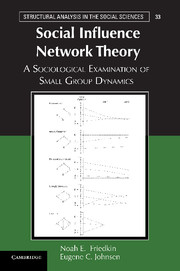Book contents
- Frontmatter
- Contents
- List of Tables and Figures
- Acknowledgments
- Preface
- PART I INTRODUCTION
- PART II INFLUENCE NETWORK PERSPECTIVE ON SMALL GROUPS
- 5 Consensus Formation and Efficiency
- 6 The Smallest Group
- 7 Social Comparison Theory
- 8 Minority and Majority Factions
- 9 Choice Shift and Group Polarization
- PART III LINKAGES WITH OTHER FORMAL MODELS
- Epilogue
- Appendix A Fundamental Constructs and Equations
- Appendix B Total Influences and Equilibrium
- Appendix C Formal Analysis of Dyadic Influence Systems
- Appendix D Social Positions in Influence Networks
- Appendix E Goldberg's Index of Proportional Conformity
- Appendix F Gender-Homophilous Small Groups
- References
- Index
6 - The Smallest Group
Published online by Cambridge University Press: 03 May 2011
- Frontmatter
- Contents
- List of Tables and Figures
- Acknowledgments
- Preface
- PART I INTRODUCTION
- PART II INFLUENCE NETWORK PERSPECTIVE ON SMALL GROUPS
- 5 Consensus Formation and Efficiency
- 6 The Smallest Group
- 7 Social Comparison Theory
- 8 Minority and Majority Factions
- 9 Choice Shift and Group Polarization
- PART III LINKAGES WITH OTHER FORMAL MODELS
- Epilogue
- Appendix A Fundamental Constructs and Equations
- Appendix B Total Influences and Equilibrium
- Appendix C Formal Analysis of Dyadic Influence Systems
- Appendix D Social Positions in Influence Networks
- Appendix E Goldberg's Index of Proportional Conformity
- Appendix F Gender-Homophilous Small Groups
- References
- Index
Summary
In this chapter, we analyze the process of interpersonal influence on attitudes in isolated dyads. Dyadic relationships are usually part of larger networks of interpersonal relationships. Although most relationships are not isolated, there are instances of dyads whose members are isolated on particular issues that do not involve the influences of other persons. Here, our theoretical focus is on the influence systems of such isolated dyads, the smallest groups in which interpersonal influence may occur.
Simmel (1950) argued that social processes in isolated dyads are qualitatively different from those in triads and larger groups. He suggested that the presence of a third party (e.g., a “tertius gaudens”) importantly modifies the interaction between two persons. His ideas are not rigorously described but they are, nonetheless, important in sensitizing us to the possibility that certain social processes may occur in isolated dyads that do not occur in embedded dyads. Other investigators also have suggested that dyads are different from larger groups, that they may not simply be a special case of a group with n persons, but entail distinctive mechanisms (Levine and Moreland 1990: 586). For instance, Levine and Moreland (1998: 417) write,
Most social psychologists view dyads as groups, noting broad similarities between social behavior in dyads and larger groups. But several important differences have been noted as well (Moreland, Hogg, and Hains 1994). […]
- Type
- Chapter
- Information
- Social Influence Network TheoryA Sociological Examination of Small Group Dynamics, pp. 138 - 159Publisher: Cambridge University PressPrint publication year: 2011



